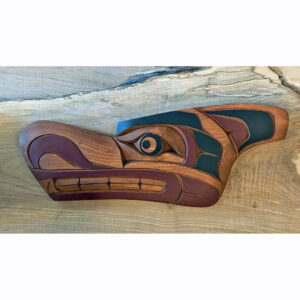First Nations Bukwus Wild Man Mask
$2,200.00
This intense and powerful mask measures approximately 11 x 8 x 8 inches and includes horsehair. The painting and carving is of utmost quality. The artist is a well known Kwakiutl (Kwakwaka’wakw) First Nation carver whose fine art is sold around the world. This piece is priced at $2200.
Bukwus (sometimes “bakwas”, “bokwus”, “bookwus” or “bukwis”) is one of the supernatural spirits of the Kwakwaka’wakw people of coastal British Columbia.
Bukwus is a spirit of the dead identified with an afterlife realm inhabited by various ghosts, especially the souls of those who have drowned. Bukwus may serve as the guide between the realms of life and the afterlife. Depending on the myth, Bukwus may also contribute more directly to their deaths.
Bukwus is often called “wild man of the woods” and is described as a gaunt, haggard wild man with a bony face. He is dressed in ragged garments and has long, disheveled hair.
He lives in an invisible house in the forest and the spirits of the drowned congregate there. In some myths he is described as the consort of dzunukwa, and the father of her children.
Bukwus emerges from the forest very early in the morning before too many people are about. He eats ghost food out of cockle shells. Bukwus lingers at the forest threshold at the shore or along forest paths, offering assistance and food to people who are lost. He tries to offer his ghost food to living humans who are stranded in the woods, in order to bring them over to the ghost world. Those who eat Bukwus’ food end up in Bukwus’ realm of the dead.
In traditional Kwakiutl cosmology, Bukwus is clearly a spirit. He is the subject of carved shamanic masks and appears during rituals, especially the traditional winter dance. However, he is now sometimes also identified with Bigfoot or Sasquatch and thus assumed to be a cryptid, an as yet unidentified living being.
In some lore, Bukwus is also known as a Cannibal Giant of the coastal Northwest.
Variant names: Boks or Puks (Bella Coola/Salishan), Bowis (Tsimshian/Penutian), Pi’kis (Nass-Gitksian/Penutian), Pokwas, Pukmis (Nootka/Wakashan), Pukwubis (Makah/ Wakashan).


